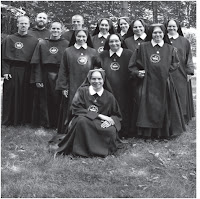Religious Liberty’ and Conflicting Rights Claims
by Brother André Marie January 10, 2013
Roberto de Mattei, the author of the piece, expresses what is no doubt a controversial, if very true, thesis: “For this reason we say that man has the right to profess, not any religion, but to profess the only true one. Only if religious liberty is intended as Christian liberty, will it be possible to speak of the right to it.”
As our American pluralism becomes increasingly more diverse (a friend jokes that we all now share “Islamo-Buddheo-Judeo-Christian values”), to embrace not only diverse cultures and religions, but also diverse “sexualities,” the oxymoronic nature of religious liberty becomes more apparent.
Let me explain: The Koran allows Muslim men to marry up to four wives. Mormons of an older “tradition” also practice polygamy. Episcopalians now allow same-sex “marriage” in their iconic Washington National Cathedral. Yet the Catholic Church denies that such rights exist, and, in fact, says that they fly in the face of man’s duty to obey God’s law; and, yes, God Himself has a right to be obeyed in the matter. Some devil worshipers assert a religious right to practice animal sacrifice. Yet PETA activists would assert that such rights contradict the rights of the animals themselves. Even putatively “conservative” Catholic politicians speak of the right to contraception, while their more putatively liberal counterparts assert a “right” to abortion. To the Catholic, these alleged rights contradict the rights both of God and of the babies being murdered.
This is but a scratching of the surface. A virtual infinity of details can be included in the argument. For instance, with the UN constantly inventing new fundamental human rights, like the right to Internet access (high-speed Internet access is a right in Finland), those whose religious practice rules out such things, like the Amish, will see their rights collide with contrary rights.
At one time, when Catholics, Jews, and Protestants were in general agreement about the natural law — at least in more obvious cases — it seemed that a genuine “Judeo-Christian” pluralism would be possible in America, theoretically, at least. But, as the Protest Revolt continues (it having no real principle of unity or doctrinal stability), and religious bodies themselves embrace increasingly bizarre anthropological errors, the facade comes crashing down and pluralism devolves into warring rights claims. Those claims will be arbitrated by the massive bureaucracy of the Nanny State, itself an interested party that is fully armed with ideologically charged legal positivism.
In this mess, the traditional doctrine looks more and more sane: error and evil have no rights. Better said, man has no right to believe a lie or commit a sin.
Whether the state should outlaw all sin is, of course, another question, the answer to which is no, and tolerance in the interest of the common good was always part of Catholic social teaching. (Within due limits, one tolerates what is evil, not what is another man’s right.)
When the Church seeks only her “equal rights” with others, she fights a losing battle. It would be better for her to evangelize and thus charitably neutralize the competing rights claims of the opposition.-from Catholicism.org





